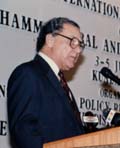Message from Muhammad Nawaz Sharif, the Prime Minister
of Islamic Republic of Pakistan for the International Conference on Iqbal and the Asian
Renaissance [delivered by Senator Javid Iqbal], Kuala Lumpur, 3-5 June 1997
|
 Javid Iqbal |
|
Allama Muhamad Iqbal, the poet-philosopher of Pakistan, uniquely
combined political leader, sublime poet, visionary, philosopher and expositor of wisdom in
his person. His knowledge of classical poetry, philosophy and religion was unexcelled
among his contemporaries and his works covering the experiences of truth of the entire
pre-modern and modern world revolutionised many fields and infused a new spirit into the
community. These aspects of his thought and personality would be
discussed and elaborate upon by the learned assembly that meets under the auspices of the
Institute of Policy Research and the patronage of Dato Seri Anwar Ibrahim, the Deputy
Prime Minister. I have no intention to trespass on the fields which properly belong to the
scholars of Iqbal studies but as the Prime Minister of Pakistan and as a very humble
student of Iqbal, I deem it my honour to pay my homage to the cherished memory of the
great poet, sage, philosopher and thinker on this celebrated occasion. |
My religious upbringing in student days in Lahore, the city of Iqbal, and the community
life – permeated as it was with his verses and ideas – imbued in me a profound
sense of respect for Iqbal and his ideas, through these idea, an attitude of tolerance and
a sincere and fervent belief that all of us belong to only one community and that is the
universal community of mankind.
Iqbal not only fought for humanitarian ideals but inculcated in his
person the life of the mind, the arts and imagination thus transcending the cultural
specificity to inhabit the realm of universal ideas. He sought to reinvigorate the Asian
self, fractured and deformed by colonialism and tried to demonstrate that Asian and Asian
traditions are part and parcel of a world built on the dignity of man, an idea which
should not be taken as the exclusive domain of the west.
Allama Muhammad Iqbal was born at the stage of history when almost all
the Eastern and most of the Muslim countries were living a miserable life under the yoke
of Western imperialism. At that time, oriental nations were not only politically enslaved
but also had the zeal of life and courage to get rid of the yoke of the alien’s rule.
The Western alien rilers even made them doubtful about their splendid intellectual and
cultural heritage. He was convinced that these forces remained active behind the long
process of decline and decay of the Eastern nations. This revolutionary poet inspired the
slave nations to rise up and steer their ship towards the shores of liberty and freedom.
He says:
"I will take out my worn-out caravan in the pitch darkness of
night.
My sight will emit sparks and my breath will produce flames."
No doubt Iqbal’s message of liberty and freedom played an effective
role in reawakening of the East and inspiring them to wage a struggle against the foreign
rule.
Iqbal’s work show that he was a keen reader of history. He opined
that until and unless they attain liberation from alien rule they would not become in a
position to be the standard-bearers of a dynamic civilisation as they had been in the
past.
Faith in God and unceasing and untiring action is the essence of his
message. And in this he emerges not only truly Islamic but also truly human and universal.
Iqbal thought that Muslim unity is a fruit of common faith and such a religious binding
and compulsion on every true Muslim aiming at the independence, solidarity and welfare of
the Muslims. But the Western propagandists took that the fulfilment of this idea could
make an end to their exploitation and imperialism. So they started a malicious propaganda
campaign against this innocuous idea and called it an aggressive movement under the name
of the Pan-Islamism. Iqbal had to condemn this propaganda in the strongest terms.
Iqbal said, "I have no prejudice against any community or nation in
the world. All I want is to see Islam return to its pristine simplicity". Clarifying
the impression of "Pan-Islamism", he says, "Islam does not recognise caste
or race or colour question, at least in the Muslim world, a question which modern European
civilisation, with all its achievements in science and philosophy, has not been able to
solve Pan-Islamism is only Pan-Humanism.
In 1923, in one of his longer poem, he said:
The annals of the Muslim Community reveal the point
That you are the watch-guard of the nations of the Asia lands.
Tulu-i-Islam (The Emergence of Islam)
The idea of guardianship may not be understood in an economic or
political sense only. It is primarily and above all a matter of civilisational and
intellectual issues as the East has always been the repository of wisdom and spirituality,
and it is through focusing on the protagonists of his wisdom and spirituality that the
East can make significant contribution to the civilisational dialogue. It is in this
respect that the Conference Muhammad Iqbal and the Asian Renaissance is to be regarded as
an extremely important stop toward this all important goal and I whole-heatedly associate
myself with the present theme, which is directly related to us, and to the forthcoming
events in the series and pray that it would be helpful in creating a just and peaceful
world order.


| Main || About IKD || Conferences/Events
|| Southeast Asia 2000 Project || Press Releases || IKD
Links |
| Anwar Ibrahim ||
Inquiries |